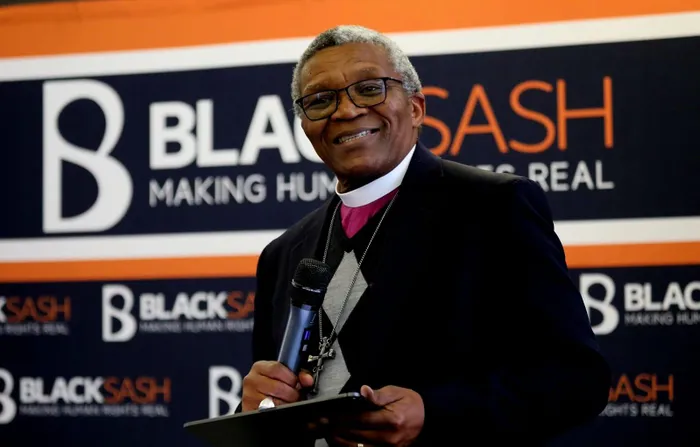How Black Sash's 70-year legacy continues to shape human rights advocacy

Bishop Malusi Mpumlwana gave a keynote address at the Black Sash 70th Gauteng regional event at Constitution Hill on Wednesday.
Image: Timothy Bernard / Independent Newspapers
One of the country's oldest civil society and human rights organisations, Black Sash, celebrated its 70th anniversary at Constitution Hill in Johannesburg on Wednesday.
Established in 1955 by a group of white women activists, Black Sash has been at the forefront of some of the most fervent human rights campaigns, having taken the government and other entities to court over various human rights violations.
In recent years, this formidable organisation has turned its attention to tackling issues of social protection, dignity, and democracy on behalf of millions of social grant recipients, who continue to bear the brunt of indignity, shame, and inequality more than 30 years since the advent of democracy.
Black Sash's regional manager and advocate for social justice, Thandiwe Zulu, commended the founding members and those who dedicated their lives to fighting both social and political injustice, which continues despite the advent of democracy in 1994.
"It is with immense pride and deep gratitude that we welcome you today. This celebration is more than a marker of time, but is a celebration of the contribution made by our founders. The women who dared to challenge the apartheid regime, known for its cruelty and inequality. This inequality remains etched into the geography of our cities and townships.
"Over the years, Black Sash has created a space of dignity for those who were denied their rights to justice and equality. From the injustice of pass laws to forced removal to defending the right to social protection, our work has always been driven by the belief that every right must be protected," Zulu said.
The organisation, which has evolved over the years, has been commended for its contribution towards equitable justice and equipping ordinary people with information and tools to fight for their basic human rights.
In Gauteng, home to some of the country’s most unequal and densely populated communities, the organisation is credited for having played a critical role in building civic resistance, providing paralegal advice, and defending the rights of the most marginalised.
One of the earliest activists, Judith Hawarden, took guests down memory lane to Black Sash's formation and how in the 1970s, a group of women collaborated with other women in a series of pickets, protests, and other campaigns that placed human rights issues at the centre of the injustices of the apartheid regime.
"When the apartheid regime tried to flex its muscles and tried to change the laws in Parliament, six women became outraged as they could not allow this injustice and racist law to go unchallenged, and each one of these women went home and called on other women to join in under the name, Women's Defense of the Constitution League. But because they wore a sash as a sign of mourning over these laws, the media then gave them the name Black Sash. Since then, the organisation became known as Black Sash," she stated.
For Bishop Malusi Mpumlwana, who gave the keynote address, Black Sash represents an insurmountable fight against race-based laws, injustice, and empowerment of ordinary citizens through information sharing.
"Black Sash mounted protests against unjust government actions and campaigned against just about any and every form of injustice. The emphasis was on unjust laws such as pass laws, forced removals, and Bantustans, and the lost fundamental was about the search for information through its information services that continue to equip ordinary people with information to navigate the minefields of the apartheid regime and its unjust laws," he stated.
siyabonga.sithole@inl.co.za